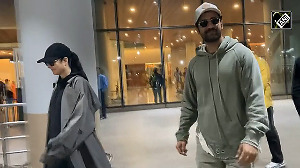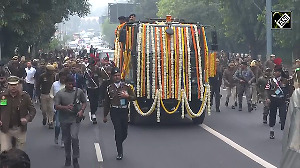 When I was growing up I realised my father was special. I had a hazy picture that he was famous. I was eight years old when Bauji retired (from the army) in 1956 and migrated from Meerut to Jhansi. Hundreds of people gathered at the Meerut railway station to bid him farewell.
When I was growing up I realised my father was special. I had a hazy picture that he was famous. I was eight years old when Bauji retired (from the army) in 1956 and migrated from Meerut to Jhansi. Hundreds of people gathered at the Meerut railway station to bid him farewell.
We came to Jhansi to stay with my grandfather. My father, honoured with the Padma Bhushan in 1956, had to look after his huge family without financial help from the government.
I once saw him play a match for the Jhansi Heroes Club against Ceylon in 1962, and realised his genius. Whatever he received, he passed to the wingers without missing a single ball. He was so fluid in his passing and tackling the ball. At 57, to play at that level was truly an achievement in itself, but to win that match by six goals was sheer brilliance.
Though we didn't spend much time with him, he taught us the importance of discipline. He never joked with us. When he was home, we would sit in the other room for fear of being pulled up for playing hockey. He never inspired or trained us to play hockey. Deep inside there was bitterness that the sport did not give him what he deserved. He did not want us to play hockey.
Unki monetary problems unko pinch karti thi [His monetary problems hurt him]. Though he never told us about his pain we could understand it. He was barely earning anything. He would give my mother 400 rupees a month in the sixties. To support a family of seven sons and four daughters with that amount was impossible.
Bauji was a simple man with a great fascination for hunting. Every Saturday his friends from the army would take him for shikaar and they would return with deer, Neel Gais or Barah Singhas.
 Bauji dreamt of owning a motorcycle. He finally fulfilled his desire. But the funny part was that he spent more time pushing it than actually riding it. It was a second-hand motorcycle that just refused to run for more than a few minutes.
Bauji dreamt of owning a motorcycle. He finally fulfilled his desire. But the funny part was that he spent more time pushing it than actually riding it. It was a second-hand motorcycle that just refused to run for more than a few minutes.
After many years he discovered I had been playing hockey. He was not very happy, but analysed my matches, especially the 1971 World Cup that we lost, following the games on the radio and in the newspapers. He hated losing. Not finishing first was as good as losing for him. Today, our team finishes fourth and they get accolades, endorsements and money!
Bauji never ever told us stories about his playing days. We listened to them only when journalists came home to interview him.
After losing a practice game against Germany, 1-4, before the 1936 Berlin Olympics, Bauji masterminded a great win in the Olympic final. Despite suffering from fever, Bauji said he would play the match and called for a meeting the night before the final. Spreading the national tricolour on the table, Bauji urged his senior teammates to do or die.
"Marenge ya jeet ke niklenge," he told his team-mates.
In front of 80,000 people and Adolf Hitler, India won 8-1 against Germany, with Bauji and my uncle Roop Singh playing without shoes.
Hitler invited Bauji to settle down in Germany and work for his army, but Bauji turned down his offer, saying he loved his country too much to leave it for anything else.
In 1972, the Munich Olympics Organising Committee invited him as a special guest, but he could not go because of lack of funds. Indira Gandhi's government refused to sponsor his visit.
Bauji's last days were very painful. On a measly pension of 400 rupees, without any government or federation aid, he spent the last days of his life a very bitter man. As a son, it was painful to watch.
Today's players are more interested in money than Olympic glory. My father was a very sentimental man who played more for the glory of the nation than personal gain.
Ashok Kumar was a member of India's 1972 and 1976 Olympic teams. He played a stellar role in India's 1975 World Cup triumph.
As told to Faisal Shariff







 © 2024 Rediff.com -
© 2024 Rediff.com -